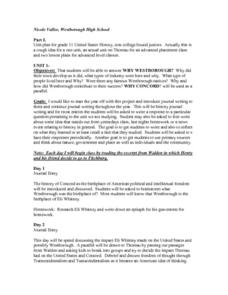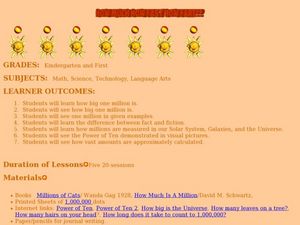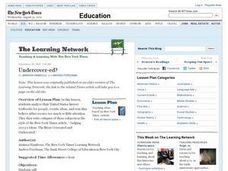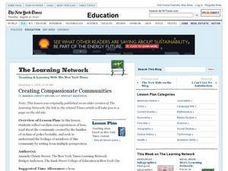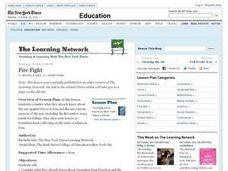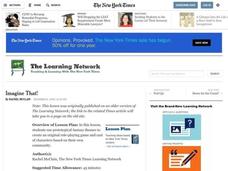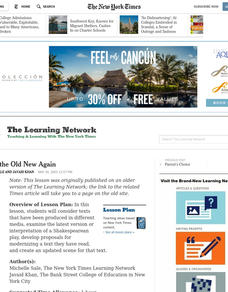Curated OER
The Learning Network: Re-envisioning Classic Stories
Readers reflect on enjoyable stories they know, brainstorm criteria that make a story "good," analyze a New York Times article about innovative children's performances, re-envision classics on their own, and peer edit drafts. Use this as...
Curated OER
Prize Numbers
Students explore what a proof is, how and why mathematicians create them and compose essays on how reason and logic are employed in the workplace. They explore whether any three lines can make a triangle and attempt to verify Goldbach's...
Curated OER
Thoreau
Eleventh graders answer the question Why Westborough? Why did their town develop as it did, what types of industry were here and why. They are introduced to journal writing. Students free write about ideas that stand out from class. ...
Curated OER
How Much, How Fast, How Far?
Students investigate the concept of the number one million. In this number concepts lesson, students read the book How Much is a Million? and brainstorm questions, such as "how many leaves are on a tree" and "how many hairs are on your...
Curated OER
Express Yourself Lesson Seed 4
Get started with The Cay. First, provide some background information and images that relate to the novel. Then pupils can create double-entry journals. Once that is complete, read the first two chapters, encouraging individuals to record...
Curated OER
Undercover-ed
Have your class engage in critical-thinking activities using this resource. Learners discuss a variety of topics they think get too much, or too little, attention from the press. They analyze why these topics are over or underrated....
Curated OER
Christmas Candy
Here is a tasty topic for a lesson: Christmas candy! Third and fourth graders research classic Christmas candies, then create their very own! They write a descriptive paragraph about their candy, then use KidPix to create an illustration...
Curated OER
Let's Call It Automatic
Students write whatever comes into their minds quickly and extend that strategy to art. They draw whatever ideas come to mind and students create in a stream of consciousness style. They listen to different types of music while drawing.
Curated OER
Creating Compassionate Communities
Have you ever lost someone? Middle and high school learners journal about a time they experienced the loss of someone through death, divorce, moving, or another type of change. They share their responses and discuss an article relating...
Curated OER
Fire Fight
While somewhat dated (students write letters to President George W. Bush about the Iraq War), this lesson could be a good way to reinforce rhetorical reading and critical thinking. Students examine information regarding Operation Iraqi...
Curated OER
Every Living Thing
Learners read the book "Every Living Thing." They read one story at a time, and participate in various activities. Some of these activities include the following ideas: Students write about a time when they were in a similar situation as...
Curated OER
Say It with Meaning: Applying Sayings and Phrases
Students complete a unit of lessons on well known sayings and phrases. They create a journal, write paragraphs, sequence events, and analyze key vocabulary for various sayings and phrases throughout the school year.
Curated OER
"The Pianist" As A Tool For Classroom Instruction About the Holocaust
Learners watch "The Pianist" to gain insight on the Holocaust and World War II. They write an essay based on ideas from the film and read a variety of poems and writings from the time period. In groups, they discuss the diffuculties of...
Missouri Department of Elementary
Put Yourself in Check
The final lesson in a four-part unit on conflict resolution offers middle schoolers strategies for how to keep themselves in check when involved in conflicts. A role-play activity and a reflective journal stress the importance of...
Curated OER
Citizen Advocacy
Students examine how citizens can influence legislation. They watch a video, develop a list of how citizens can influence legislation, answer video discussion questions, conduct Internet research, and write a recommendation for change to...
Curated OER
Imagine That!
Enter the fantastical world of "Dungeons and Dragons" and other role-playing games with this lesson from The New York Times. Middle schoolers create the outline for a role-playing game based on their own community. Then, they write a...
Curated OER
The Scoop on Local Business
How do local businesses support their state or regional economy? The New York Times has prepared another great lesson for your class. They begin by listing products grown or manufactured in their state or region then write interview...
Curated OER
A Way with Words
How do facts and opinions impact the news? After reading "How to Cover a War" from the New York Times, middle schoolers evaluate the claims in the article. They also consider the media's responsibilities in reporting during wartime....
Curated OER
Simple Inequalities
Students solve inequalities. For this inequalities lesson, students evaluate simple inequalities. They examine vocabulary words. Students participate in breath holding activities and write inequalities to represent the activity. In...
Curated OER
Alphabet Soup
Students study language. In this unique alphabets lesson plan, students read the article by Michael Everson "For the World's A B C's, He Makes 1's and 0's." They discuss the importance of alphabets and work in small groups to create a...
Teach Engineering
The Grand Challenge
Magnetic resonance imaging, just how safe is it? The introduction to unit study of magnetic resonance imaging technology presents the grand challenge questions of how an MRI machine works, the risks involved, the physics involved, and...
Curated OER
Making the Old New Again
How does a new version of a Shakespearean play change in the adaptation process? Use this New York Times' Learning Network instructional activity to consider texts that have been produced in different media. Middle schoolers examine the...
Curated OER
Paraphrasing and Summarizing
Read an article about the migration of our ancestors and write a paragraph. Pupils paraphrase and summarize to restate the information found in a nonfiction text. They write a shortened version of the reading to demonstrate the...
National First Ladies' Library
'Tis a Gift to Be Simple: The Shaker People
Students identify the difficulties and benefits of a utopian community. They examine their own ideas of utopia and research an example of one such community that has had an impact on our own culture.




